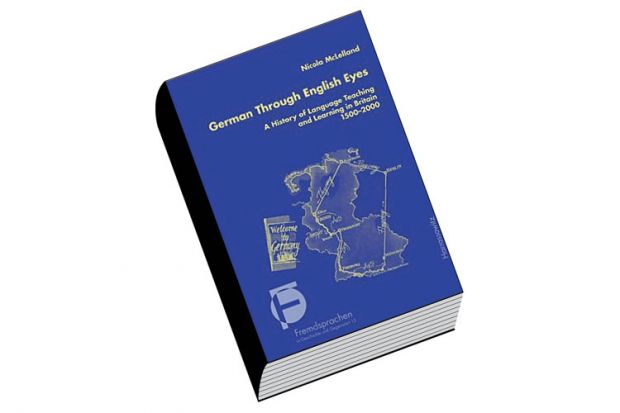It was famously Mark Twain who, after trying to learn German, could only conclude that German textbooks contain more exceptions to the rule than instances of it, and are best read when standing on the head so as to reverse the “strange” word order.
Although German syntax may arguably pose some difficulties for an English learner, one does not need to exert oneself in gymnastic exercises in order to understand it. As Nicola McLelland’s comprehensive analysis shows, there is more to German textbooks than just the presentation of rules and exceptions. They offer a fascinating lens through which one can view not only developments in educational and linguistic theories but also shifts in cultural and political representations.
Authors writing about the teaching of German in the UK at a time when the number of learners has plummeted to its lowest-ever level must feel like conservationists trying to preserve a rare species. As with that of other modern languages, the state of German in Britain can only be described as disastrous. The decision in 2004 to make the study of modern foreign languages optional at GCSE and the widespread view that speaking English is sufficient have contributed to this decline, which has already had serious consequences for businesses and the diplomatic service.
However, as McLelland convincingly shows, such views were not always universal. Although the beginnings of German language teaching in Britain were tricky – the publication in 1680 of the country’s first German grammar drove its author Martin Aedler into bankruptcy – by the end of the 18th century there was a boom in German textbooks prompted by the growing appetite for German literature among the British nobility. Further spurred by Germany’s scientific achievements in the long 19th century and a somewhat romanticised belief in a common Anglo-Saxon heritage, the trend continued until the First World War. Learning German became not only a matter of taste but a necessity. In the 20th century, the two world wars had an obvious negative impact, and then the fall of the Berlin Wall sparked a great deal of interest in Germany and its language. But since the late 1990s, the subject has been in a steady decline.
After minutely surveying historical developments, McLelland turns to the contents of textbooks and offers a rigorous analysis of their underlying linguistic and cultural representations. These texts are of interest not only as documents of societal and linguistic shifts in what was seen as the “proper” language to be taught, but also as ideological echoes of complex Anglo-German political relations. Take the representation of Germany leading up to the Second World War: affinity with German “cousins” led some textbook authors to show sympathetic attitudes towards National Socialism, whereas others mocked life under the Nazis. East Germany was also problematic, and it is notable by its absence until the 1970s, when full diplomatic relations were established. As McLelland concludes, textbooks present only small fractions of cultures, but the way these fractions are selected tells us more about the ideologies underlying the “home” culture than about the language being taught.
This work takes us on a fascinating historical journey. Alongside its focus on developments in educational and linguistic theories, it offers unique insights into Anglo-German relations told not “from above” but “from below”, through the lens of textbooks, archival records and personal testimonies.
Sylvia Jaworska is lecturer in applied linguistics, University of Reading.
German through English Eyes: A History of Language Teaching and Learning in Britain 1500-2000
By Nicola McLelland
Harrassowitz, 444pp, €78.00
ISBN 9783447101486
Published 1 August 2015
Register to continue
Why register?
- Registration is free and only takes a moment
- Once registered, you can read 3 articles a month
- Sign up for our newsletter
Subscribe
Or subscribe for unlimited access to:
- Unlimited access to news, views, insights & reviews
- Digital editions
- Digital access to THE’s university and college rankings analysis
Already registered or a current subscriber?




